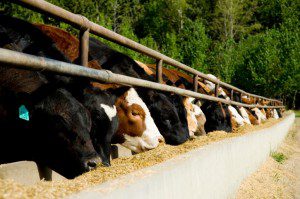Gov. Rick Scott joined several other governors in asking the federal government to suspend the requirement for putting a certain amount of ethanol into America’s gas tanks, saying it’s causing a shortage of cattle feed for Florida ranchers.

A public comment period on the proposal to temporarily suspend the Renewable Fuel Standard, mandating a certain amount of ethanol in the nation’s gas supply, ended earlier this month. The Obama Administration has until Nov. 13 to decide on the question.
The standard is aimed at reducing pollution and the nation’s dependence on crude oil, as well as helping the ethanol industry boost its own production.
But Scott on Tuesday wrote to U.S. Environmental Protection Administrator Lisa Jackson voicing support for waiving the requirement, following letters sent by governors of several other states going back to August.
Ethanol producers use about 40 percent of the nation’s corn, and the crop has been severely limited because of this summer’s drought.
“The use of corn, a major source of cattle feed, as a base for ethanol production decreases its availability and increases its price to the detriment of the cattle industry,” Scott wrote. “…Due to the extreme drought conditions, the short supply of corn and an increase in feed prices, Florida’s cattlemen are seeing a significant decrease in the price of feeder cattle, which has had a negative economic impact of $80 million to the industry this year.”
The beef cow industry in Florida is worth more than $4 billion – the state’s ranches have more than a million head of beef cattle.
According to USDA reports, corn prices have increased about 60 percent since June 15.
Governors in North Carolina, Arkansas, Maryland and Delaware have all previously called for a suspension of the fuel standard requirement. All four of those states are big poultry producers.
The Obama Administration has pushed for more renewable energy production and has previously rejected requests to suspend the requirement. The president has said he wants to reduce consumption of foreign oil – and ethanol backers note that the industry produces more than one-and-a-half times the amount of volume than would be produced by approving the Keystone Pipeline to increase the use of Canadian oil by Americans.
The renewable fuels industry opposes the waiver proposal, releasing a statement last week urging the EPA to reject the governors’ requests.
The ethanol industry is already reducing production significantly and said that the impact of a waiver of the requirement on the price of corn would be “trivial.”
“Studies estimating the impact of a potential RFS waiver on corn prices show that waiving the requirements in 2013 might reduce corn prices by as little as $0.04 per bushel, or 0.5 percent,” Bob Dinneen, president of the Renewable Fuels Association, wrote in a letter to the EPA on Oct. 11. “Further, prices for other feed key ingredients (e.g., distillers grains) may increase in response to a waiver, meaning net feed costs could be unchanged or may actually increase.”
The cattle industry has also filed comments with the EPA on the issue.
“We are looking at the smallest cow herd since 1952, and if input costs continue to increase, we do not expect this trend to turn around in the next several years,” the National Cattlemen’s Beef Association said last week.
by David Royse


